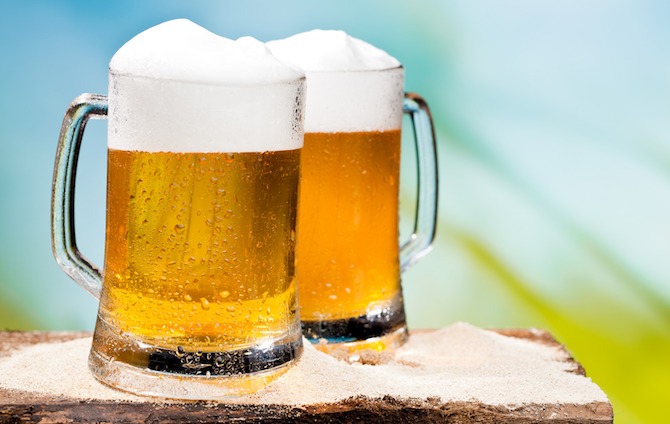Put that beer down! OK, you don’t have to toss your beer. Enjoy it. But don’t forget to consider the effect of alcohol on the body. How does alcohol affect fitness after all?
I’m sorry to report that the late night G&Ts don’t do your performance any good at all. In fact, the research suggests that consuming alcohol is detrimental to performance and recovery.
Believe it or not though, for a time it was believed that alcohol in small amounts could help improve athletic performance!
Since then, many studies, including this one, titled Alcohol And It’s Effects On Sprint & Middle Distance Running found that alcohol is detrimental. Even if you usually drink moderately, but go wild to celebrate once in a while. That binge drinking makes a difference — and not a positive one.

The effect of alcohol on the body
A 2006 paper by Susan M. Shirreffs, PhD at Loughborough University, found that small amounts of alcohol added to an athlete’s diet limited the the ability of the athlete’s liver and muscles to retain glycogen (an important energy store for your body) by almost 50% after eight hours.
That’s pretty significant.
So no matter what sport you do, this presents a significant problem. Other negative effects of alcohol consumption on the body include:
- Reduced reaction time
- Motor control impairment
- Impaired judgement
- Impaired memory
- Disruption to sleep patterns
- Liver function damage
- Hypoglycemia
- Raised blood pressure
- Dehydration
- Restricted ability for the heart’s to contract during exercise
- Impaired body temperature regulation
The list goes on.
The effects of alcohol on recovery
Consuming large amounts of alcohol after an event — like when we celebrate a marathon with a few beers — can negatively affect our ability to recover.
You’re probably familiar with the “marathon stairs test” right? You know the one. Your legs are so stiff and sore it’s like you’ve got two short planks down the legs of your pants making it impossible to climb the stairs. Forget about going down stairs in the normal fashion. Many a marathon runner has had to resort to sleeping on the living room couch for three days until they could bend their knees again! The effect of alcohol on the body will only make this worse.
Drinking your head off after the race might feel good in the moment, but it won’t aid your recovery one little bit.
One study observed that the alcohol actually causes additional inflammation, reducing the athlete’s ability to adequately recover from strenuous exercise.
To further explain, the folks at Boston University suggest that alcohol can affect the body’s ability to recover in the following ways:
- Limits the body’s ability to absorb essential nutrients like B1, B12, Folic Acid and Zinc
- Constricts aerobic metabolism
- Alcohol sugars are converted into fatty acids (not good for recovery)
- Lowers oxygen-carrying capacity in the blood
- Alcohol causes dehydration which can exacerbate muscle strains and niggles
What About Non-Alcoholic Beer?
The folks at James’s Gate brewery in Dublin, home of Guinness and one the world’s most infamous drinking cultures (it’s OK, I’m Irish, I can slag myself off) have told us for years that “Guinness Is Good For You”.
Maybe they were right — to a degree anyway.
Research from 2011 suggests that non-alcoholic beer is good for reducing inflammation and upper respiratory tract infections in marathon runners.
A research team led by Johannes Scherr, M.D. studied 277 healthy male marathon runners participating in the Munich Marathon. They set out to determine whether non-alcoholic beer would show antioxidant, anti-pathogenic and anti-inflammatory properties in their study participants.
The study found that consuming a modest amount of non-alcoholic beer for three weeks before and two weeks after a marathon actually reduces post-race inflammation and the incidence of upper respiratory tract infections. “The naturally occurring polyphenolic compounds of non-alcoholic beer are responsible for fighting these common ailments in distance runners,” the researchers wrote.
Running after Drinking Alcohol
And if you’re worried about your health and performance, don’t even think about running a Beer Mile — that’s when runners race a mile, chugging a beer between each lap of the track. It’s all fun and games until someone has a cardiac arrest.
In the same study mentioned above, the researchers state that “alcohol consumption before exercise decreases myocardial contractility”. In other words, alcohol limits the ability of your heart to contract.
Now I don’t know about you, but that’s enough for me to decide that running after drinking alcohol, specifically downing a can of beer every 400 meters in an hard-run mile, is just a bad idea.
So… should you crack open another beer?
Hopefully I’ve answered the question ‘how does alcohol affect fitness?’. It seems there’s no doubt that alcohol negatively affects you fitness and running performance. I hope this post has gone some way to helping you understand the effect of alcohol on the body.
If you want to perform to your best and live a healthy and active life, there’s no place for over-indulgence in alcohol. Everything in moderation!
The post How Does Alcohol Affect Fitness & Running Performance? appeared first on Run Coaching, Ironman and Triathlon Specialists - Kinetic Revolution.
from Run Coaching, Ironman and Triathlon Specialists – Kinetic Revolution http://www.kinetic-revolution.com/how-does-alcohol-affect-running-fitness-and-performance/

No comments:
Post a Comment